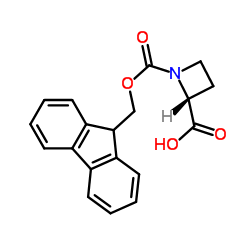374791-02-3
| Name | (2R)-1-(9H-fluoren-9-ylmethoxycarbonyl)azetidine-2-carboxylic acid |
|---|---|
| Synonyms |
fmoc-d-azetidine-2-carboxylic acid
(2R)-1-[(9H-Fluoren-9-ylmethoxy)carbonyl]-2-azetidinecarboxylic acid (R)-N-Fmoc-Azetidine-2-Carboxylic Acid |
| Density | 1.4±0.1 g/cm3 |
|---|---|
| Boiling Point | 543.3±43.0 °C at 760 mmHg |
| Melting Point | 139.4ºC |
| Molecular Formula | C19H17NO4 |
| Molecular Weight | 323.343 |
| Flash Point | 282.3±28.2 °C |
| Exact Mass | 323.115753 |
| PSA | 66.84000 |
| LogP | 2.74 |
| Vapour Pressure | 0.0±1.5 mmHg at 25°C |
| Index of Refraction | 1.651 |
Synonym:(R)-N-(9-Fluorenylmethoxycarbonyl)azetidine-2-carboxylic acid; 1,2-Azetidinedicarboxylic acid, 1-(9H-fluoren-9-ylmethyl) ester, (2R)- Section 2 - COMPOSITION, INFORMATION ON INGREDIENTS
Risk Phrases: None Listed. Section 3 - HAZARDS IDENTIFICATION EMERGENCY OVERVIEW
The toxicological properties of this material have not been fully investigated. Potential Health Effects Eye: May cause eye irritation. Skin: May cause skin irritation. May be harmful if absorbed through the skin. Ingestion: May cause irritation of the digestive tract. The toxicological properties of this substance have not been fully investigated. May be harmful if swallowed. Inhalation: May cause respiratory tract irritation. The toxicological properties of this substance have not been fully investigated. May be harmful if inhaled. Chronic: No information found. Section 4 - FIRST AID MEASURES Eyes: In case of contact, immediately flush eyes with plenty of water for at least 15 minutes. Get medical aid. Skin: In case of contact, flush skin with plenty of water. Remove contaminated clothing and shoes. Get medical aid if irritation develops and persists. Wash clothing before reuse. Ingestion: If swallowed, do not induce vomiting unless directed to do so by medical personnel. Never give anything by mouth to an unconscious person. Get medical aid. Inhalation: If inhaled, remove to fresh air. If not breathing, give artificial respiration. If breathing is difficult, give oxygen. Get medical aid. Notes to Physician: Treat symptomatically and supportively. Section 5 - FIRE FIGHTING MEASURES General Information: As in any fire, wear a self-contained breathing apparatus in pressure-demand, MSHA/NIOSH (approved or equivalent), and full protective gear. During a fire, irritating and highly toxic gases may be generated by thermal decomposition or combustion. Extinguishing Media: Use water spray, dry chemical, carbon dioxide, or chemical foam. Section 6 - ACCIDENTAL RELEASE MEASURES General Information: Use proper personal protective equipment as indicated in Section 8. Spills/Leaks: Vacuum or sweep up material and place into a suitable disposal container. Clean up spills immediately, observing precautions in the Protective Equipment section. Avoid generating dusty conditions. Provide ventilation. Section 7 - HANDLING and STORAGE Handling: Wash thoroughly after handling. Use with adequate ventilation. Minimize dust generation and accumulation. Avoid contact with eyes, skin, and clothing. Keep container tightly closed. Avoid breathing dust. Storage: Store in a tightly closed container. Store in a cool, dry, well-ventilated area away from incompatible substances. Section 8 - EXPOSURE CONTROLS, PERSONAL PROTECTION Engineering Controls: Facilities storing or utilizing this material should be equipped with an eyewash facility and a safety shower. Use adequate ventilation to keep airborne concentrations low. Exposure Limits CAS# 374791-02-3: Personal Protective Equipment Eyes: Wear appropriate protective eyeglasses or chemical safety goggles as described by OSHA's eye and face protection regulations in 29 CFR 1910.133 or European Standard EN166. Skin: Wear appropriate protective gloves to prevent skin exposure. Clothing: Wear appropriate protective clothing to prevent skin exposure. Respirators: Follow the OSHA respirator regulations found in 29 CFR 1910.134 or European Standard EN 149. Use a NIOSH/MSHA or European Standard EN 149 approved respirator if exposure limits are exceeded or if irritation or other symptoms are experienced. Section 9 - PHYSICAL AND CHEMICAL PROPERTIES Physical State: Powder Color: white Odor: Not available. pH: Not available. Vapor Pressure: Not available. Viscosity: Not available. Boiling Point: Not available. Freezing/Melting Point: 139.4 deg C Autoignition Temperature: Not available. Flash Point: Not applicable. Explosion Limits, lower: Not available. Explosion Limits, upper: Not available. Decomposition Temperature: Solubility in water: Specific Gravity/Density: Molecular Formula: C19H17NO4 Molecular Weight: 323.34 Section 10 - STABILITY AND REACTIVITY Chemical Stability: Stable at room temperature in closed containers under normal storage and handling conditions. Conditions to Avoid: Dust generation. Incompatibilities with Other Materials: Strong oxidizing agents. Hazardous Decomposition Products: Nitrogen oxides, carbon monoxide, carbon dioxide. Hazardous Polymerization: Has not been reported Section 11 - TOXICOLOGICAL INFORMATION RTECS#: CAS# 374791-02-3 unlisted. LD50/LC50: Not available. Carcinogenicity: (R)-N-FMOC-Azetidine-2-carboxylic acid - Not listed by ACGIH, IARC, or NTP. Section 12 - ECOLOGICAL INFORMATION Section 13 - DISPOSAL CONSIDERATIONS Dispose of in a manner consistent with federal, state, and local regulations. Section 14 - TRANSPORT INFORMATION IATA Not regulated as a hazardous material. IMO Not regulated as a hazardous material. RID/ADR Not regulated as a hazardous material. Section 15 - REGULATORY INFORMATION European/International Regulations European Labeling in Accordance with EC Directives Hazard Symbols: Not available. Risk Phrases: Safety Phrases: S 24/25 Avoid contact with skin and eyes. WGK (Water Danger/Protection) CAS# 374791-02-3: No information available. Canada None of the chemicals in this product are listed on the DSL/NDSL list. CAS# 374791-02-3 is not listed on Canada's Ingredient Disclosure List. US FEDERAL TSCA CAS# 374791-02-3 is not listed on the TSCA inventory. It is for research and development use only. SECTION 16 - ADDITIONAL INFORMATION N/A |
